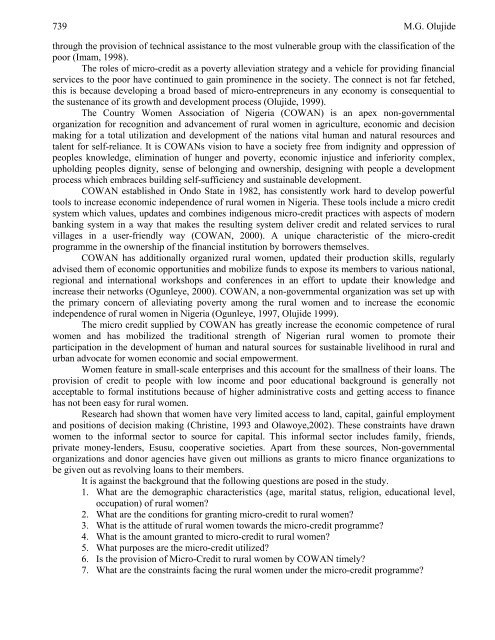European Journal of Scientific Research - EuroJournals
European Journal of Scientific Research - EuroJournals
European Journal of Scientific Research - EuroJournals
You also want an ePaper? Increase the reach of your titles
YUMPU automatically turns print PDFs into web optimized ePapers that Google loves.
739 M.G. Olujide<br />
through the provision <strong>of</strong> technical assistance to the most vulnerable group with the classification <strong>of</strong> the<br />
poor (Imam, 1998).<br />
The roles <strong>of</strong> micro-credit as a poverty alleviation strategy and a vehicle for providing financial<br />
services to the poor have continued to gain prominence in the society. The connect is not far fetched,<br />
this is because developing a broad based <strong>of</strong> micro-entrepreneurs in any economy is consequential to<br />
the sustenance <strong>of</strong> its growth and development process (Olujide, 1999).<br />
The Country Women Association <strong>of</strong> Nigeria (COWAN) is an apex non-governmental<br />
organization for recognition and advancement <strong>of</strong> rural women in agriculture, economic and decision<br />
making for a total utilization and development <strong>of</strong> the nations vital human and natural resources and<br />
talent for self-reliance. It is COWANs vision to have a society free from indignity and oppression <strong>of</strong><br />
peoples knowledge, elimination <strong>of</strong> hunger and poverty, economic injustice and inferiority complex,<br />
upholding peoples dignity, sense <strong>of</strong> belonging and ownership, designing with people a development<br />
process which embraces building self-sufficiency and sustainable development.<br />
COWAN established in Ondo State in 1982, has consistently work hard to develop powerful<br />
tools to increase economic independence <strong>of</strong> rural women in Nigeria. These tools include a micro credit<br />
system which values, updates and combines indigenous micro-credit practices with aspects <strong>of</strong> modern<br />
banking system in a way that makes the resulting system deliver credit and related services to rural<br />
villages in a user-friendly way (COWAN, 2000). A unique characteristic <strong>of</strong> the micro-credit<br />
programme in the ownership <strong>of</strong> the financial institution by borrowers themselves.<br />
COWAN has additionally organized rural women, updated their production skills, regularly<br />
advised them <strong>of</strong> economic opportunities and mobilize funds to expose its members to various national,<br />
regional and international workshops and conferences in an effort to update their knowledge and<br />
increase their networks (Ogunleye, 2000). COWAN, a non-governmental organization was set up with<br />
the primary concern <strong>of</strong> alleviating poverty among the rural women and to increase the economic<br />
independence <strong>of</strong> rural women in Nigeria (Ogunleye, 1997, Olujide 1999).<br />
The micro credit supplied by COWAN has greatly increase the economic competence <strong>of</strong> rural<br />
women and has mobilized the traditional strength <strong>of</strong> Nigerian rural women to promote their<br />
participation in the development <strong>of</strong> human and natural sources for sustainable livelihood in rural and<br />
urban advocate for women economic and social empowerment.<br />
Women feature in small-scale enterprises and this account for the smallness <strong>of</strong> their loans. The<br />
provision <strong>of</strong> credit to people with low income and poor educational background is generally not<br />
acceptable to formal institutions because <strong>of</strong> higher administrative costs and getting access to finance<br />
has not been easy for rural women.<br />
<strong>Research</strong> had shown that women have very limited access to land, capital, gainful employment<br />
and positions <strong>of</strong> decision making (Christine, 1993 and Olawoye,2002). These constraints have drawn<br />
women to the informal sector to source for capital. This informal sector includes family, friends,<br />
private money-lenders, Esusu, cooperative societies. Apart from these sources, Non-governmental<br />
organizations and donor agencies have given out millions as grants to micro finance organizations to<br />
be given out as revolving loans to their members.<br />
It is against the background that the following questions are posed in the study.<br />
1. What are the demographic characteristics (age, marital status, religion, educational level,<br />
occupation) <strong>of</strong> rural women?<br />
2. What are the conditions for granting micro-credit to rural women?<br />
3. What is the attitude <strong>of</strong> rural women towards the micro-credit programme?<br />
4. What is the amount granted to micro-credit to rural women?<br />
5. What purposes are the micro-credit utilized?<br />
6. Is the provision <strong>of</strong> Micro-Credit to rural women by COWAN timely?<br />
7. What are the constraints facing the rural women under the micro-credit programme?

















